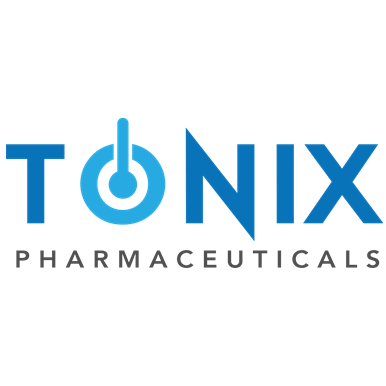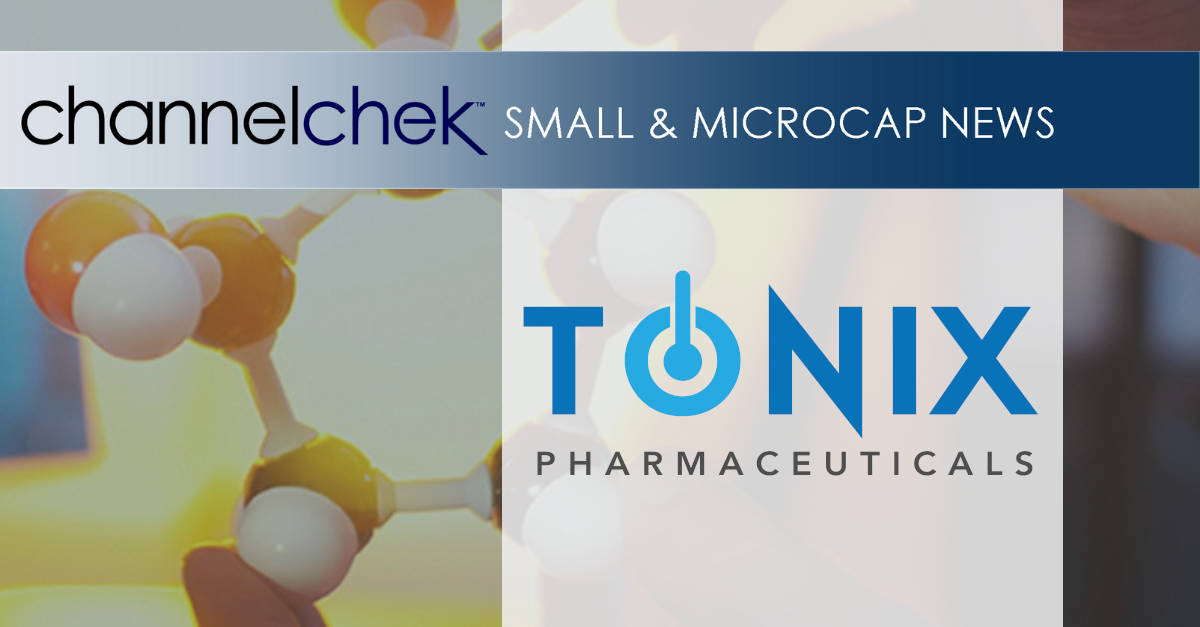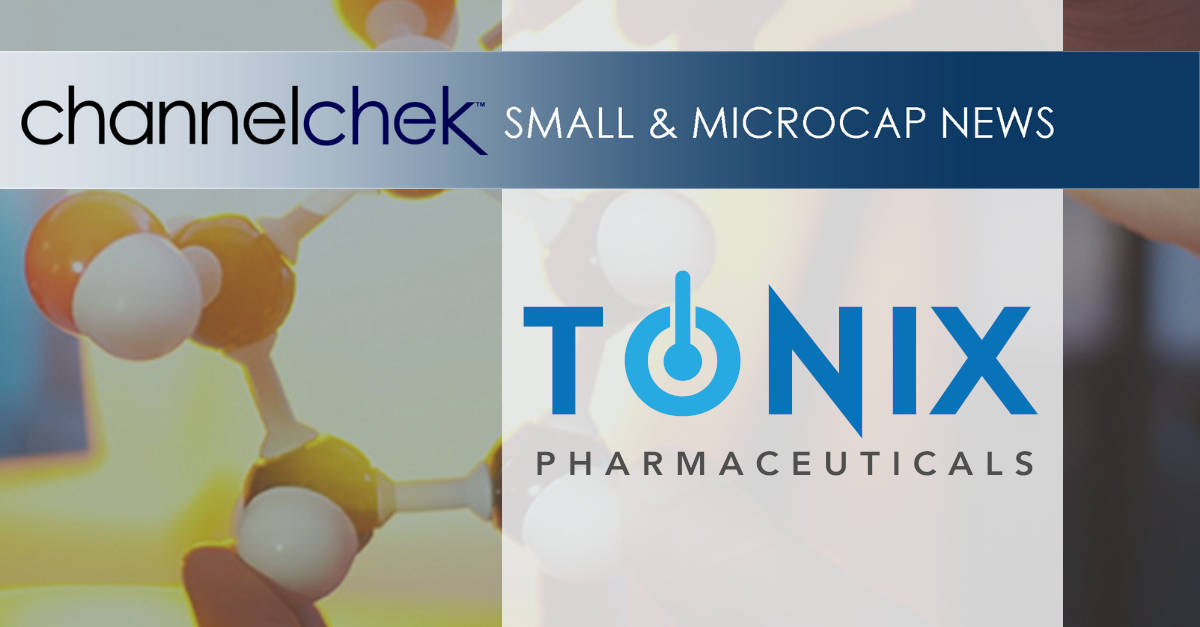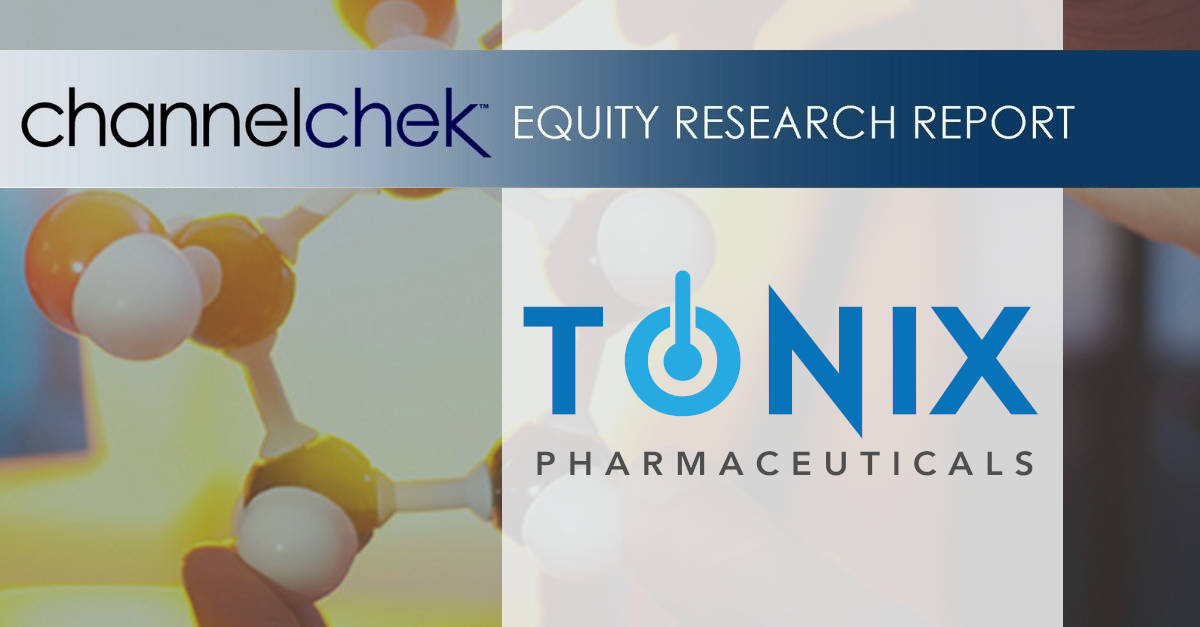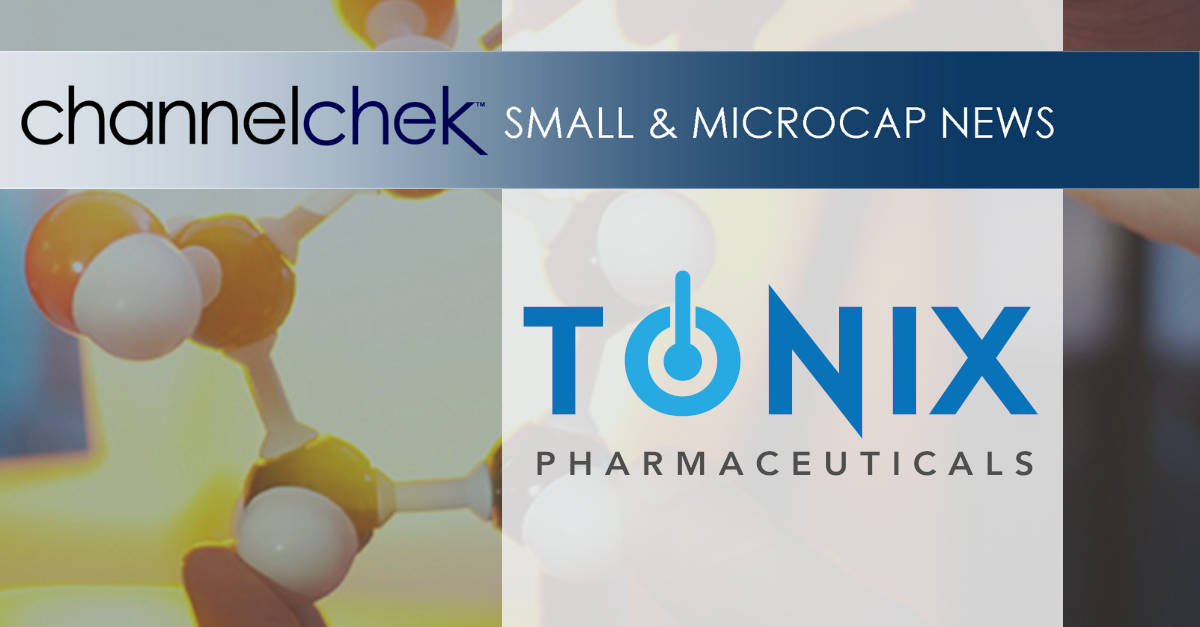Research News and Market Data on TNXP
May 17, 2023 7:00am EDT
Research Supports Direct Role for Restoring Neuroplasticity and Upsets Previously Held Beliefs About the Significance of Neurotransmitters in Treating Depression
Findings Explain Why Tianeptine Is Not Associated with Sexual Dysfunction and Weight Gain
Mechanism Supports Development of TNX-601 ER for a Broad Range of Neurodegenerative Diseases and Psychiatric Disorders
CHATHAM, N.J., May 17, 2023 (GLOBE NEWSWIRE) — Tonix Pharmaceuticals Holding Corp. (Nasdaq: TNXP) (Tonix or the Company), a clinical-stage biopharmaceutical company, today announced the molecular mechanism of action of tianeptine, the active ingredient of TNX-601 ER (tianeptine hemioxalate extended-release tablets), currently in Phase 2 clinical development for the treatment of major depressive disorder (MDD)*. Based on pharmacology and medicinal chemistry experiments, scientists at Tonix have established that tianeptine is an agonist for the nuclear peroxisome proliferator-activated receptor (PPAR) isoforms PPAR-β/δ and PPAR-γ, and tianeptine’s effects on these PPAR isoforms account for its ability to induce neuroplasticity in cultured neurons.
The findings upset a long-held belief that the only way to restore the connectivity of neurons damaged in the state of depression was to increase the synaptic levels or activity of neurotransmitters such as the monoamines serotonin, norepinephrine, and dopamine. The new findings show that selective activation of nuclear PPAR-β/δ and PPAR-γ in neurons and supporting glia appears to be a more direct mechanism to achieve the goal of restoring neuronal connectivity, which is called neuroplasticity. Drugs that restore neuroplasticity are called plastogens.1-3 Consequently, tianeptine is a plastogen that acts directly on nuclear receptors that regulate gene expression in neurons and microglia.
“The discovery that tianeptine stimulates neuroplasticity by activating certain PPAR isoforms could lead to a paradigm shift in designing new antidepressants, and change the relative reliance developers place on targeting synaptic neurotransmitter levels and activity,” said Stephen Stahl, M.D., Ph.D., Adjunct Professor of Psychiatry at the University of California San Diego, Chairman of Neuroscience Education Institute, author of the bestselling clinical manual, Essential Psychopharmacology Prescriber’s Guide, and consultant to Tonix. “This may lead to better pharmacological treatments for depression and for a range of neurodegenerative diseases in which neuronal connections are atrophying and the need to restore the connectivity is paramount to achieving more positive and more sustainable outcomes. Tianeptine avoids some of the more intolerable side effects of the traditional antidepressants because it cuts in line and intervenes downstream from the monoamine transporters and receptors.”
The new research provides clarity on why tianeptine does not cause sexual dysfunction, weight gain, or several other treatment-limiting toxicities associated with traditional antidepressants. Tianeptine treats depression by activating select nuclear PPAR isoforms, and has little to do with monoaminergic neurotransmitters, which are known to be implicated in the most frequently cited side effects of most marketed antidepressants. Key experiments were performed by scientists at Tonix’s Research and Development Center (RDC) in Frederick, Maryland.
“Understanding the mechanism of action of a molecule generally speeds its development and often points the way to broader clinical application,” said Seth Lederman, M.D., Chief Executive Officer of Tonix Pharmaceuticals. “Despite its success in treating depression outside of the U.S. for more than 30 years, tianeptine’s mechanism has remained obscure. Pioneering studies by Prof. Bruce McEwen, Ph.D. at Rockefeller University revealed that tianeptine stimulates stress-atrophied neurons to form new connections.1 Subsequently, Prof. Ronald Duman, Ph.D. at Yale University discovered that enhancing these connections is a common principle underlying the therapeutic effects of traditional antidepressants, which only act indirectly on neuroplasticity by changing the level and activity of synaptic neurotransmitters.”4
“In animal models, tianeptine restores neuroplasticity and reverses stress-induced impairments through activation of select nuclear PPAR isoforms without modulating synaptic monoamine neurotransmitters,”1 said Gregory Sullivan, M.D., Chief Medical Officer of Tonix Pharmaceuticals. “Tianeptine mimics naturally occurring polyunsaturated fatty acid in binding to PPARs.5 When compared to the traditional classes of antidepressants (SSRIs, tricyclics, etc.), the tianeptine sodium immediate release products available outside of the U.S. demonstrate comparable efficacy6 and decreased side effects including sexual dysfunction7-9, derangement of sleep architecture10, sedating effects11 despite anxiolysis, weight gain even with long term treatment12, and cognitive impairment.”11, 13-15
Dr. Sullivan continued, “Regarding potential future indications beyond our current program in MDD, the proposed mechanism is consistent with the clinical effects of tianeptine in promoting cognition in Alzheimer’s disease, Parkinson’s disease and bipolar disorder14,15 and motivates us to develop TNX-601 ER as a treatment for these and other conditions, in addition to our previously stated objectives to study it in posttraumatic stress disorder (PTSD) and corticosteroid-induced cognitive dysfunction. The PPAR-β/δ target is validated by prior work on agonists treating animal models of neurodegenerative and autoimmune disease of the central nervous system.16 The PPAR-γ target is validated by prior work treating peripheral diabetes in animals and as FDA-approved drugs, and the concept that Alzheimer’s can be considered a form of diabetes that affects the CNS, or type-III diabetes.”17
Dr. Sullivan noted that the new Tonix findings about tianeptine’s mechanism dispel the notion that tianeptine’s weak µ-opioid receptor activity was central to its mechanism of treating depression.18 This hypothesis was proposed based on results in the forced swim test (FST) using high-dose tianeptine in mice.19 “Our work found no connection between tianeptine’s neuroplastic effects on cultured neurons and its weak µ-opioid receptor agonism,” Dr. Sullivan said. “In fact, we have identified a new chemical entity related to tianeptine, TNX-4300, that restores neuroplasticity in cultured neurons and is free from µ-opioid receptor activity.”
Tonix is planning to submit data supporting tianeptine’s mechanism of action for presentation at upcoming scientific conferences and for publication in peer reviewed journals.
* TNX-601 ER is an investigational new drug and is not approved for any indication
1 McEwen, BS, et al. Mol. Psychiatry 2010, 15 (3), 237–249.
2 Olson DE. J Exp Neurosci. 2018, 19;12:1179069518800508.
3 Cooper T, et al. J Psychopharmacol. 2023, 37(3):242-247.
4 Price RB, Duman R. Mol Psychiatry 2020, 25 (3), 530-543.
5 Helmstädter M et al. Int J Mol Sci. 2022, 23(17):10070.
6 Wagstaff AJ, et al. CNS Drugs 2001, 15 (3), 231-59.
7 Bonierbale M, et al. Curr Med Res Opin 2003, 19 (2), 114-124
8 Ducrocq F. Encephale 1999, 25 (5), 515-6. French.
9 Atmaca M, et al. Hum Psychopharmacol 2003, 18 (4), 277-80.
10 Le Bon O. Dialogues Clin Neurosci 2005, 7 (4), 305-13.
11 Yoon JS, et al. Clin Psychopharmacol Neurosci 2003, 1, 27-34.
12 Dalery J, et al. Hum Psychopharmacol 2001, 16 (S1), S39-S47.
13 Jeon HJ, et al. J Clin Psychopharmacol 2014, 34 (2), 218-25.
14 García-Alberca JM, et al. J Alzheimer’s Dis 2022, 88 (2), 707-720.
15 Kauer-Sant’Anna M, et al. J Psychopharmacol 2019, 33 (4), 502-510.
16 Kahremany S et al. Br J Pharmacol 2015, 172(3):754-70
17 Nguyen et al., Int J Mol Sci. 2010, 21(9):3165
18 Samuels BA, et al. Neuropsychopharmacol 2017, 42 (10), 2052-2063.
19 Reardon S. Nature 2019, 571 (7766), 456-457.
About Depression
According to the National Institute of Mental Health, an estimated 21 million adults in the U.S. in 2020 experienced at least one major depressive episode1, with highest prevalence among individuals aged 18-25 at a rate of 17.0%. For approximately 2.5 million adults in the U.S., adjunctive therapies are necessary for depression treatment.2,3 Depression is a condition characterized by symptoms such as a depressed mood or loss of interest or pleasure in daily activities most of the time for two weeks or more, accompanied by appetite changes, sleep disturbances, motor restlessness or retardation, loss of energy, feelings of worthlessness or excessive guilt, poor concentration, and suicidal thoughts and behaviors. These symptoms cause clinically significant distress or impairment in social, occupational, or other important areas of functioning. The majority of people who suffer from depression do not respond adequately to initial antidepressant therapy.4
1 Data Courtesy of SAMHSA on Past Year Prevalence of Major Depressive Episode Among U.S. Adults 2020. Retrieved from http://www.nimh.nih.gov/health/statistics/major-depression.shtml
2 IMS NSP, NPA, NDTI MAT-24-month data through Aug 2017.
3 Kubitz N, et al. PLoS One 2013, 8 (10), e76882.
4 Rush AJ, et al. Am J. Psychiatry 2007, 163 (11), 1905-1917.
About TNX-601 ER
TNX-601 ER (tianeptine hemioxalate extended-release tablets) is a novel oral formulation of tianeptine designed for once-daily daytime dosing in development as a candidate for the treatment for MDD, posttraumatic stress disorder, and neurocognitive dysfunction associated with corticosteroid use. Tianeptine sodium (amorphous) immediate release (dosed 3 times daily) was first marketed for depression in France in 1989 and has been available for decades in Europe, Russia, Asia, and Latin America for the treatment of depression. Tianeptine sodium has an established safety profile from decades of use in these jurisdictions. Currently no tianeptine-containing is product approved in the U.S. and no extended-release tianeptine product is approved in any jurisdiction. Tonix discovered a novel oxalate salt of tianeptine that may provide improved stability, consistency, and manufacturability compared to known salt forms of tianeptine. In animal models, tianeptine restores dendritic arborization of pyramidal neurons in the CA3 region of hippocampus and in the dentate gyrus region promotes new neuron formation and integration into hippocampal networks.1 Tianeptine’s enhancement of neuroplasticity in animal models of stress is believed to be mediated by activation of PPAR isoforms PPAR-β/δ and PPAR-γ, which makes TNX-601 ER’s properties distinct from traditional monoaminergic antidepressants in the U.S. and contributes to its potential for clinical indications beyond MDD and stress disorders. Tianeptine and its MC5 metabolite are also weak mu-opioid receptor (MOR) agonists that present a potential abuse liability if illicitly misused in large quantities (typically abused at 8-80 times the therapeutic dose on a daily basis2). In patients who were prescribed tianeptine for depression, the French Transparency Committee found an incidence of misuse of approximately 1 case per 1,000 patients treated3 suggesting low abuse liability when used at the antidepressant dose in patients prescribed tianeptine for depression. Clinical trials have shown that cessation of a therapeutic course of tianeptine does not appear to result in dependence or withdrawal symptoms following 6-weeks4-8, 3-months9, or 12-months10 of treatment. The ER formulation of TNX-601 includes several potentially abuse deterrent ingredients include gel forming polymers which impede extraction. In addition, the tablet’s hardness makes it difficult to crush, cut or grind to fine particle size, which potentially hinders efforts to misuse by insufflation or intravenous routes. Tianeptine’s reported pro-cognitive and anxiolytic effects as well as its ability to attenuate the neuropathological effects of excessive stress responses suggest that it may also be used to treat posttraumatic stress disorder (PTSD), and neurocognitive dysfunction associated with corticosteroid use. TNX-601 ER is expected to have patent protection through 2037.
1 McEwen, B. S., et al. Mol. Psychiatry 2010, 15 (3), 237–249.
2 Lauhan, R., et al. Psychosomatics 2018, 59 (6), 547–53.
3 Haute Authorite de Sante; Transparency Committee Opinion. Stablon 12.5 Mg, Coated Tablet, Re- Assessment of Actual Benefit at the Request of the Transparency Committee. December 5, 2012.
4 Emsley, R., et al. J. Clin. Psychiatry 2018, 79 (4)
5 Bonierbale M, et al. Curr Med Res Opin 2003, 19(2):114-124.
6 Guelfi, J. D., et al. Neuropsychobiology 1989, 22 (1), 41–48.
7 Invernizzi, G. et al., Neuropsychobiology 1994, 30 (2–3), 85–93.
8 Lepine, J. P., et al. Hum. Psychopharmacol. 2001, 16 (3), 219–227.
9 Guelfi, J. D. et al., Neuropsychobiology 1992, 25 (3), 140–148.
10 Lôo, H. et al., Br. J. Psychiatry. Suppl. 1992, 15, 61–65.
Tonix Pharmaceuticals Holding Corp. *
Tonix is a clinical-stage biopharmaceutical company focused on discovering, licensing, acquiring and developing therapeutics to treat and prevent human disease and alleviate suffering. Tonix’s portfolio is composed of central nervous system (CNS), rare disease, immunology and infectious disease product candidates. Tonix’s CNS portfolio includes both small molecules and biologics to treat pain, neurologic, psychiatric and addiction conditions. Tonix’s lead CNS candidate, TNX-102 SL (cyclobenzaprine HCl sublingual tablet), is in mid-Phase 3 development for the management of fibromyalgia with topline data expected in the fourth quarter of 2023. TNX-102 SL is also being developed to treat Long COVID, a chronic post-acute COVID-19 condition. Enrollment in a Phase 2 study has been completed, and topline results are expected in the third quarter of 2023. TNX-1900 (intranasal potentiated oxytocin), in development for chronic migraine, is currently enrolling with topline data expected in the fourth quarter of 2023. TNX-601 ER (tianeptine hemioxalate extended-release tablets), a once-daily formulation being developed as a treatment for major depressive disorder (MDD), is also currently enrolling with interim data expected in the fourth quarter of 2023. TNX-1300 (cocaine esterase) is a biologic designed to treat cocaine intoxication and has been granted Breakthrough Therapy designation by the FDA. A Phase 2 study of TNX-1300 is expected to be initiated in the third quarter of 2023. Tonix’s rare disease portfolio includes TNX-2900 (intranasal potentiated oxytocin) for the treatment of Prader-Willi syndrome. TNX-2900 has been granted Orphan Drug designation by the FDA. Tonix’s immunology portfolio includes biologics to address organ transplant rejection, autoimmunity and cancer, including TNX-1500, which is a humanized monoclonal antibody targeting CD40-ligand (CD40L or CD154) being developed for the prevention of allograft rejection and for the treatment of autoimmune diseases. A Phase 1 study of TNX-1500 is expected to be initiated in the third quarter of 2023. Tonix’s infectious disease pipeline includes TNX-801, a vaccine in development to prevent smallpox and mpox, for which a Phase 1 study is expected to be initiated in the second half of 2023. TNX-801 also serves as the live virus vaccine platform or recombinant pox vaccine platform for other infectious diseases. The infectious disease portfolio also includes TNX-3900 and TNX-4000, classes of broad-spectrum small molecule oral antivirals.
*All of Tonix’s product candidates are investigational new drugs or biologics and have not been approved for any indication.
This press release and further information about Tonix can be found at www.tonixpharma.com.
Forward Looking Statements
Certain statements in this press release are forward-looking within the meaning of the Private Securities Litigation Reform Act of 1995. These statements may be identified by the use of forward-looking words such as “anticipate,” “believe,” “forecast,” “estimate,” “expect,” and “intend,” among others. These forward-looking statements are based on Tonix’s current expectations and actual results could differ materially. There are a number of factors that could cause actual events to differ materially from those indicated by such forward-looking statements. These factors include, but are not limited to, risks related to the failure to obtain FDA clearances or approvals and noncompliance with FDA regulations; delays and uncertainties caused by the global COVID-19 pandemic; risks related to the timing and progress of clinical development of our product candidates; our need for additional financing; uncertainties of patent protection and litigation; uncertainties of government or third party payor reimbursement; limited research and development efforts and dependence upon third parties; and substantial competition. As with any pharmaceutical under development, there are significant risks in the development, regulatory approval and commercialization of new products. Tonix does not undertake an obligation to update or revise any forward-looking statement. Investors should read the risk factors set forth in the Annual Report on Form 10-K for the year ended December 31, 2022, as filed with the Securities and Exchange Commission (the “SEC”) on March 13, 2023, and periodic reports filed with the SEC on or after the date thereof. All of Tonix’s forward-looking statements are expressly qualified by all such risk factors and other cautionary statements. The information set forth herein speaks only as of the date thereof.
Contacts
Jessica Morris (corporate)
Tonix Pharmaceuticals
investor.relations@tonixpharma.com
(862) 904-8182
Maddie Stabinski (media)
Russo Partners
Madeline.Stabinski@russopartnersllc.com
(212) 845-4273
Peter Vozzo (investors)
Westwicke/ICR
peter.vozzo@westwicke.com
(443) 213-0505
Source: Tonix Pharmaceuticals Holding Corp.
Released May 17, 2023
